7 start with I start with I
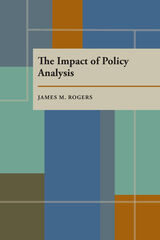
Government agencies spend billions of dollars each year for policy analysis with the expectation that improved policy will follow. Although civil servants conduct some analysis themselves, more frequently they contract with research organizations to assess the probable consequences of new social policies and to answer other policy questions.
Jams M. Rogers develops a theory that explains and predicts the impact of policy analysis. He illustrates his theory through welfare reform, where policy analysis is caught in political warfare and has little chance to improve actual policy.
During the 1960s and 1970s over $108 million was spent on four unprecedented social scientific experiments to test the effectiveness of a major proposal to reform the welfare system. Now out of favor, the negative income tax was thn considered to be an appealing alternative to welfare. Starting in New Jersey and Pennsylvania during the Johnson administration, the experimental research continued through Carter's term and helped to keep reform proposal and research organizations alive. This book examines the results of these experiments and their effect on Carter's reform attempt—the Program for Better Jobs and Income.
One of the author's main conclusions concerns the role of value conflict. If there is strong disagreement within society over the goals of policy, analysis will seldom change the minds of decision makers or influence policy. Policy analysis is more likely to influence thinking and policy if the issue involves low conflict.
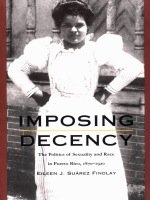
In showing how political projects and alliances in Puerto Rico were affected by racially contingent definitions of “decency” and “disreputability,” Findlay argues that attempts at moral reform and the state’s repression of “sexually dangerous” women were weapons used in batttles between elite and popular, American and Puerto Rican, and black and white. Based on a thorough analysis of popular and elite discourses found in both literature and official archives, Findlay contends that racialized sexual norms and practices were consistently a central component in the construction of social and political orders. The campaigns she analyzes include an attempt at moral reform by elite male liberals and a movement designed to enhance the family and cleanse urban space that ultimately translated into repression against symbollically darkened prostitutes. Findlay also explores how U.S. officials strove to construct a new colonial order by legalizing divorce and how feminist, labor, and Afro-Puerto Rican political demands escalated after World War I, often focusing on the rehabilitation and defense of prostitutes.
Imposing Decency forces us to rethink previous interpretations of political chronologies as well as reigning conceptualizations of both liberalism and the early working-class in Puerto Rico. Her work will appeal to scholars with an interest in Puerto Rican or Latin American studies, sexuality and national identity, women in Latin America, and general women’s studies.
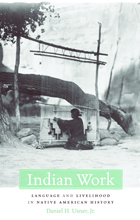
Representations of Indian economic life have played an integral role in discourses about poverty, social policy, and cultural difference but have received surprisingly little attention. Daniel Usner dismantles ideological characterizations of Indian livelihood to reveal the intricacy of economic adaptations in American Indian history.
Officials, reformers, anthropologists, and artists produced images that exacerbated Indians’ economic uncertainty and vulnerability. From Jeffersonian agrarianism to Jazz Age primitivism, European American ideologies not only obscured Indian struggles for survival but also operated as obstacles to their success. Diversification and itinerancy became economic strategies for many Indians, but were generally maligned in the early United States. Indians repeatedly found themselves working in spaces that reinforced misrepresentation and exploitation. Taking advantage of narrow economic opportunities often meant risking cultural integrity and personal dignity: while sales of baskets made by Louisiana Indian women contributed to their identity and community, it encouraged white perceptions of passivity and dependence. When non-Indian consumption of Indian culture emerged in the early twentieth century, even this friendlier market posed challenges to Indian labor and enterprise. The consequences of this dilemma persist today.
Usner reveals that Indian engagement with commerce has consistently defied the narrow choices that observers insisted upon seeing.
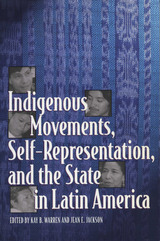
Throughout Latin America, indigenous peoples are responding to state violence and pro-democracy social movements by asserting their rights to a greater measure of cultural autonomy and self-determination. This volume's rich case studies of movements in Colombia, Guatemala, and Brazil weigh the degree of success achieved by indigenous leaders in influencing national agendas when governments display highly ambivalent attitudes about strengthening ethnic diversity.
The contributors to this volume are leading anthropologists and indigenous activists from the United States and Latin America. They address the double binds of indigenous organizing and "working within the system" as well as the flexibility of political tactics used to achieve cultural goals outside the scope of state politics. The contributors answer questions about who speaks for indigenous communities, how indigenous movements relate to the popular left, and how conflicts between the national indigenous leadership and local communities play out in specific cultural and political contexts. The volume sheds new light on the realities of asymmetrical power relations and on the ways in which indigenous communities and their representatives employ Western constructions of subjectivity, alterity, and authentic versus counterfeit identity, as well as how they manipulate bureaucratic structures, international organizations, and the mass media to advance goals that involve distinctive visions of an indigenous future.


On a visit to eastern Hui'an in 1994, Sara Friedman was surprised to see a married woman reluctant to visit her conjugal home. The author would soon learn that this practice was typical of the area, along with distinctive female dress styles, gender divisions of labor, and powerful same-sex networks. These customs, she would learn, have long distinguished villages in this coastal region of southeastern China from other rural Han communities.
Intimate Politics explores these practices that have constituted eastern Hui'an residents, women in particular, as an anomaly among rural Han. This book asks what such practices have come to mean in a post-1949 socialist order that has incorporated forms of marriage, labor, and dress into a developmental scale extending from the primitive to the civilized. Government reform campaigns were part of a wholesale effort to remake Chinese society by replacing its "feudal" elements with liberated socialist ideals and practices. As state actors became involved in the intimate aspects of Huidong women's lives, their official models of progress were challenged by the diversity of local practices and commitment of local residents. These politicized entanglements have generated what the author calls "intimate politics," a form of embodied struggle in which socialist civilizing agendas—from the state-sponsored reforms of the Maoist decades to the market-based "reform and opening" of the post-Mao era—have been formulated, contested, and, in some cases, transformed through the bodies and practices of local women.
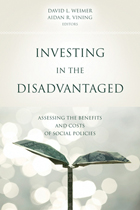
With budgets squeezed at every level of government, cost-benefit analysis (CBA) holds outstanding potential for assessing the efficiency of many programs. In this first book to address the application of CBA to social policy, experts examine ten of the most important policy domains: early childhood development, elementary and secondary schools, health care for the disadvantaged, mental illness, substance abuse and addiction, juvenile crime, prisoner reentry programs, housing assistance, work-incentive programs for the unemployed and employers, and welfare-to-work interventions. Each contributor discusses the applicability of CBA to actual programs, describing both proven and promising examples.
The editors provide an introduction to cost-benefit analysis, assess the programs described, and propose a research agenda for promoting its more widespread application in social policy. Investing in the Disadvantaged considers how to face America’s most urgent social needs with shrinking resources, showing how CBA can be used to inform policy choices that produce social value.
READERS
Browse our collection.
PUBLISHERS
See BiblioVault's publisher services.
STUDENT SERVICES
Files for college accessibility offices.
UChicago Accessibility Resources
home | accessibility | search | about | contact us
BiblioVault ® 2001 - 2024
The University of Chicago Press









